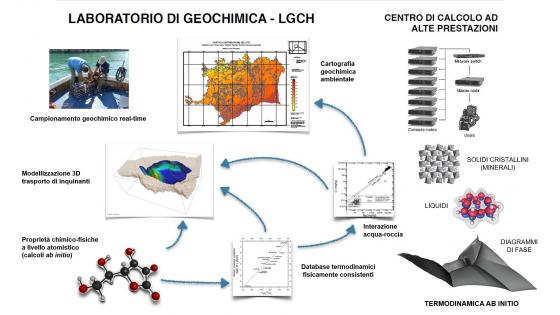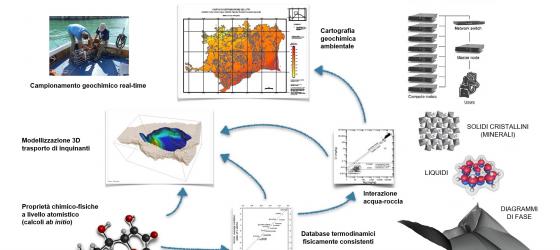LOCATION: Palazzo delle Scienze, Ground Floor, Rooms T-6 and T-12
BRIEF DESCRIPTION:
The research activities of the Laboratory of Geochemistry focus on the following topics: i) ab initio quantum-mechanical calculations, atomistic simulation and computational modelling of the chemico-physical and thermodynamic properties of minerals and crystalline solids, glasses, silicate melts, aqueous solutions, geothermal fluids and volcanic gases; ii) numerical simulation of water-rock interaction processes and relevant geological implications; iii) 3D modelling of transport phenomena of potentially ecotoxic elements and pollutants in different environments (e.g. waste dumps, harbour areas, etc.) ; iv) geochemical mapping via in-situ measurement and numerical modelling of environmental chemico-physical parameters.
The acquired, designed or self-produced instrumentation is used to assess, simulate and process in real time the dynamics of geological systems with a high bio-geochemical reactivity, such as rocks and minerals, stream sediments, surface water, groundwater, seawater, silicate melts and endogenous gases (natural or anthropic, like CO2 and methane).
The members of LGCH contribute also to the preservation, management and development of the historical and modern mineralogical collections at DISTAV.
RESEARCH GROUP MEMBERS: Donato Belmonte (responsabile), Marino Vetuschi Zuccolini, Mattia La Fortezza, Marianna Miola, Francesca Menescardi
LINK TO RESEARCH LINES, PROJECTS AND PUBLICATIONS:
Research topics: Thermal and thermodynamic processes - https://distav.unige.it/en/node/706; Ecotoxic elements and environmental degradation - https://distav.unige.it/en/node/705; Geothematic mapping applied to the territory - https://distav.unige.it/en/node/701
Funded projects: https://distav.unige.it/progetti_ricerca
Dynamics and timescales of volcanic plumbing systems - MUR PRIN 2020; Geochemical Map of Liguria; MATRAC-ACP INTERREG project; Oceanic Megatransforms, a New Class of Plate Boundaries - MUR-PRIN 2017; INGV Pianeta Dinamico 2023-2025 EMOTION project
LABORATORY EQUIPMENT:
- Computer cluster HPC with mixed INTEL/AMD Quad core processors (88 CPUs)
- Program package for thermodynamic and ab initio quantum-mechanical calculations: CRYSTAL06, CRYSTAL09, CRYSTAL14, CRYSTAL 17; QUANTUM ESPRESSO 4.3.1, SIESTA v.3.1, CPMD 3.15, PWSCF (Sissa, Trieste);
LAMMPS, GROMACS; FactSage8.2, Perple_X, Thermo-Calc; PHREEQC, PHAST Seriale e Parallelo; SGeMS; Gaussian03, NWChem 6.0 (EMSL), GAMESS v. 2011R1
- Accumulation chamber for measuring CO2 fluxes
- Ion Chromatograph DIONEX DX-100 with acquisition data system SHIMADZU C-R8A
- HACH DR/2010 Spectrophotometer for field evaluation of dissolved analytes in water
- Digital alkalinity titrator for field activities
- HANNA and Eureka multi-parameter water probes (T, pH, Eh, DO, TDS, ISE: NO3, NH4, Ca) with 5m and 20m cable, and self-powered probe and datalogger
- Portable phmeter for teaching and fieldwork activities
- Reagents, PTFE bottles, plastic bags
- Teflon sieves and non-reactive material with 500 and 150 microns mesh, spare mesh
- Muffle furnace (model ISE250 1100°C) with platinum and porcelain crucibles; thermometric furnace (model Nse140.HNC)
- Digital acquisition control unit with ISE and wifi communication capability (Libelium)
- Membrane probes for measuring dissolved CO2 and CH4 in water (ProOceanus)
- Electrochemical sensors for measuring dissolved H2 and H2S in water (AMT Gmbh)
- Optical sensors for measuring dissolved NO3 calibrated for seawater (TriOS) and chlorophyll-a
- Digital acquisition and processing unit for instrument data (in house)
- Towable containment box for instruments during sea activities
- Towing and communication cable, wifi control unit for handheld communication
- Android handheld with acquisition instrumentation processing software and possibility of interfacing with in-house produced software for adaptive sampling and optimisation (software in house)
- MUSE software development: 'Modelling Uncertainties as Support for Environment' - PON-GREEN PhD 2022-2024
- Development of MATRAC software for managing navigation and data acquired at sea from a mobile platform (ROV or vessel), with parallel simulation of the distribution of the reference variable and uncertainty assessment
TEACHING ACTIVITIES:
The equipment and computational resources of the Laboratory of Geochemistry are employed to support several research, teaching and fieldwork activities provided by the Research Group (courses of Geochemistry, Hydrogeochemistry, Volcanology and Geostatistics for Natural Resources).
The laboratory instrumentation is also widely used during national and international PhD schools and workshops organized by our Research Group in collaboration with other Universities, Research Institutions (e.g. INGV, CNR, ENEA) and Scientific Societies (SoGeI, SIMP, etc.) to promote the discipline.

